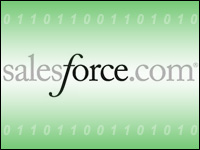
The recently concluded Dreamforce conference in San Francisco might have been the most successful CRM conference ever. That’s not hyperbole. I have been at some major events in the last 10 years that rival this year’s Dreamforce. For instance, whenever Siebel had a user conference, that was also major. But a lot has happened since the last time Siebel held an independent user event not associated with Oracle — that was in 2005 and much has happened in the intervening six years.
In that time, SaaS and cloud computing have finished their takeover of corporate computing — at least the majority of the hearts and minds. Analytics has become important everywhere (including analytics in CRM, pioneered by Siebel) and, of course, social media has given new life to the whole front office. All of this came together in the recent Dreamforce.
Beyond that, though, Salesforce has clearly shown that it intends to change the business application development and deployment paradigm with a host of databases, data storage options, programming languages and platforms.
Convincing the Skeptics
You might think that this is a good time to take a breath and contemplate a new line of work because this all seems locked down, but you’d be mistaken. Despite all the glitter of Dreamforce, there are still many minds to change. Social and cloud computing have nicely established beachheads in strategic areas, and even skeptics are likely to acknowledge that the world is changing. But there’s nothing pre-ordained that says cloud and social will carry the day.
There’s still a good deal of skepticism in the IT community about using applications from the cloud, about data security in the cloud and about performance. Where social business techniques are concerned, many old-line IT directors and CIOs still regard social media applied to business as something between a fad, a waste of time and coddling young employees.
As many of you know, I’ve been a judge in the CRM Idol competition organized by Paul Greenberg. Most of the heavy lifting (it’s still ongoing) was taken care of before Dreamforce. For instance, we all took about 40 briefings in a two-week period, and our brains are tired. But the confluence of these events has left me with a unique perspective on the marketplace enabling me to look forward and back about 10 years in each direction.
Conservative and Progressive
Looking back I can see applications built in the last decade or even earlier that still try to cover CRM’s basic stovepipes. They are applied to shrinking niches, but their owners still manage to find an audience. These applications are serviceable, but no one will confuse them with the systems of tomorrow. The futuristic applications we saw do things I didn’t even know we needed, but now I wonder, how long before they’ll hit the big time? In all of this I learned that the marketplace is simultaneously rather conservative and equally progressive.
The market is conservative in the way of the old maxim, “If it ain’t broke, don’t fix it.” And that maxim informs much of the IT community that can’t see the benefit of socializing front-office business practices no matter the growing list of success stories to the contrary that you point to.
However, in its more progressive moments, the market is like a machine hungry for fuel and raw material so that it can make the next products. This hungry market is what propels us and keeps the conservatives on their toes, so that at the first sign that the old paradigm is broken, they leap to fix it with whatever new solutions are at hand.
The False Clouds
This is not to say that backsliding is impossible. If you look at most of the cloud offerings today, you notice an eerie similarity in many products. They aren’t so much cloud solutions as they are what Salesforce CEO Marc Benioff likes to call “false clouds.” They are conventional applications running in a data center in the sky without benefit of the standards and multi-tenancy that is the heart of cloud computing.
August showed me all of that — from Idol to Dreamforce — and in the weeks and months ahead you’ll hear more from us about Idol and what seems hot to us. We’ll also be watching Salesforce to see how well it makes good on its Dreamforce promises. The conservatives and progressives will continue their back-and-forth, and it will seem like there is no progress, yet when you raise your head from the tasks immediately in front of you, it will be apparent that progress is incremental, as it has to be. That’s why, despite the success of Dreamforce, the IT debates are not over and the work continues.























































